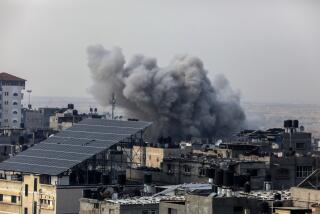Guantanamo Bay Continues as a Blot of Shame on the U.S.
Defense Secretary Donald Rumsfeld has sounded almost flabbergasted in recent days that anyone could be critical of the military’s detention of hundreds of people without trial at Guantanamo Bay, Cuba. These people are being held not because they “stole a car or robbed a bank,” he noted with his trademark sarcasm in a speech in Miami, but because they are “enemy combatants and terrorists.” It’s only common sense that different rules should apply.
To a certain extent, Rumsfeld has a point. The laws of war have long recognized the right to detain the other side’s soldiers, for the duration of the conflict, without lawyers or trials. Al Qaeda brutally attacked us on Sept. 11, and most of the world approved of our military response. That conflict is not yet over.
The detainees’ cases, the Pentagon insists, have been subject to multiple levels of internal review involving military officials, intelligence specialists and behavioral psychologists. And surely no one wants a committed Al Qaeda terrorist to be set free. Yet Guantanamo has become a black mark on the United States’ reputation, even among our staunchest allies. The International Committee of the Red Cross, the only organization to be granted access to the prisoners, departed from its long-standing policy against commenting on prison conditions to condemn prisoner treatment at Guantanamo. Newspapers worldwide routinely carry stories and editorials harshly critical of U.S. policies at Guantanamo.
The complaint is not that Al Qaeda terrorists should be released but that innocent people must be. The United States has asserted unilateral power to pick up anyone, anywhere in the world, label him an enemy combatant and hold him for as long as it wishes without any hearing or judicial review that might distinguish the innocent from the enemy.
And the complaint is not that holding prisoners of war in a specific conflict is improper, but that by defining the conflict as a war on all terrorist organizations of global reach we have rendered these powers and the resulting detentions permanent.
Still, detention without charges is nothing compared with the torture and assassination other nations have employed against suspected terrorists. So why is Guantanamo so widely condemned?
The reason lies beyond Guantanamo. Like the police shooting of a black man that touches off an urban riot because it resonates with more systemic unease, the Guantanamo detentions are seen as a symbol of a much broader problem.
The broader problem is the Bush administration’s attitude toward the rule of law. When it serves the administration’s interest, the United States applauds it, exports it and holds others to it. But when the rules don’t go its way, the administration ignores them, overrides them or breaches them. We have dropped out of the Kyoto Accords, opposed the International Criminal Court and, most conspicuously, bypassed the U.N. Security Council when it opposed our declaring war on Iraq.
Rumsfeld insists that different rules ought to apply at Guantanamo. But the world sees an administration not interested in applying any rules there. It invokes the law of war but refuses to afford the detainees the hearings the Geneva Convention requires. And it opposes any judicial review, insisting that the detainees are foreign nationals outside our borders and so have no constitutional rights.
The Supreme Court recently decided, over the government’s objections, to take up legal challenges by the Guantanamo detainees and U.S. citizen Yaser Esam Hamdi. Only after that decision did the Pentagon announce that Hamdi would be allowed to talk to his lawyer, that the juveniles and several others at Guantanamo would be released and that the military would provide annual reviews for those still detained.
The Pentagon no doubt hopes that these initiatives will show that it can be trusted with wholly unchecked authority. But the fact that it made these overtures only when threatened with legal oversight underscores the necessity of the rule of law.
Guantanamo is, in short, the perfect symbol of what the administration has sought generally in the war on terrorism: the authority to act without the constraints of law. The nations of the world are concerned that we want that authority not only on an isolated leasehold in Cuba but in their backyards as well.
David Cole, a professor at Georgetown University Law Center, is author of “Enemy Aliens: Double Standards and Constitutional Freedoms in the War on Terrorism” (New Press, 2003).
More to Read
Sign up for Essential California
The most important California stories and recommendations in your inbox every morning.
You may occasionally receive promotional content from the Los Angeles Times.










